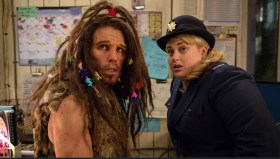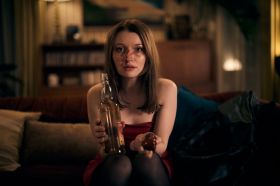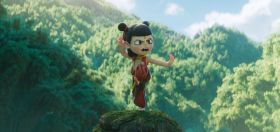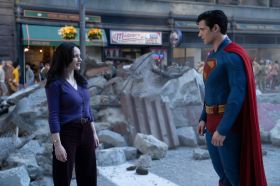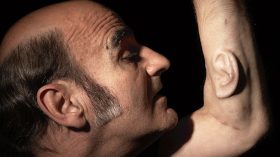From their humble beginnings as Pooraka-based home video enthusiasts to big-time directors with a 97% approval rating on Rotten Tomatoes, Michael and Danny Philippou have kept it pretty real.
Talk To Me is the directorial debut of the young Philippou brothers, also known on YouTube as RackaRacka. Centring on an audacious group of friends and a cursed hand, it boasts such a high consensus from critics the world over that you’d never guess it’s their first time making a feature film.
It stars Miranda Otto, Sophie Wilde and Zoe Terakes, and it’s getting an international release from A24.
Read: What to watch in July: new to streaming, cinemas and film festivals near you
Ahead of Talk To Me‘s Australian release on 27 July, I chatted with the identical twin Philippou brothers about scares, success, sibling rivalry, and bogan street parties.
Hi guys! I haven’t seen your film yet, but I’m going with other Letterboxd members on 17 July …
Michael: Oh my gosh, we’re so scared of the Letterboxd community – they can be so brutal!
I wouldn’t worry too much, a lot of us are going in with positive anticipation and open minds!
Danny: Oh good!
Read: What to watch in July: new to streaming, cinemas and film festivals near you
Can you talk us through going from YouTube shorts to a critically acclaimed feature debut?
Michael: It feels like we’ve been building up to it for so long, because we had so much practice doing all the YouTube stuff and our childhood movies. It just felt like it was time.
Danny: We always wanted to do feature film or television originally, and then we just fell into YouTube. And we liked it, because you get that quick satisfaction of seeing growth and views and subscribers straightaway.
So we kind of got wrapped in that world, but we always wanted to do feature film and television. When we made the switch, we never thought ‘oh, we’re going to make a critically acclaimed theatrical film’ – we just wanted to make a film that we were proud of! And to be honest, we didn’t know how it was going to be received.
We had a screening at the Adelaide Film Festival that mainly consisted of our family and friends. And they were like, ‘it’s great’. And we’re like, ‘yeah, okay, what do you really think?’ So for it to then get accepted into Sundance was crazy.
Michael: It feels like we’re dreaming.
Read: MIFF 2023: help a local filmmaker make their idea a reality
Describe your directing style – do you come to a project knowing exactly what you want?
Michael: It’s super collaborative. We loved finding heads of departments that we really admire and look up to, because we know we could never accomplish that look on our own. Like finding our DOP Aaron McLiskey, or our awesome production designer Bethany Ryan, our awesome costume designer, Anna Cahill, was absolutely essential.
Danny: The YouTube stuff was a lot more run-and-gun. You know, sometimes we’d go to a location and not even know what we’re shooting. Like, ‘we’re gonna go to this location, we have these people, and then we just make it up’.
And those YouTube video can take anywhere from two days to six months to finish. So we knew going into this film that there had to be a different approach, mainly because there’s a lot more people involved. It’s also slower moving, but what you get out of it is much more rewarding.
You mentioned in another interview that you and other crew members would act out the possession scenes before shooting –tell me more about that!
Danny: Yeah, because there’s some embarrassing possessions you’ll see in the film, and we didn’t want anyone to come to set and feel like they’re being judged. So, every actor did every single characters’ possessions, and so did the producer, the DOP, and us. It made it a lot more comfortable for the actors.
Michael: It also meant that the actors could find moments in each possession to grab and put into their own possessions. But it ended up making us really bummed out because some characters don’t get possessed, and we’d see the actor doing a possession scene for their castmate and be like ‘oh, she’s so good! I wish her character could be possessed too!’
Danny: Sophie (Wilde) really set the bar because she was the first one to get possessed. She set an amazing standard. We knew we had something special from the moment we shot that scene.
Read: Horror films: are these the scariest ever made?
How does your experience of house parties in your youth inform the party scenes in Talk to Me?
Danny: That’s all based on the bogan hangouts we used to have! Like honestly, on our street in Pooraka there was this mum named Fiona that would host these parties where all the kids were allowed to drink, so we’d all flock over to her house. We based those scenes on those sorts of parties, and also on specific people. It’s actually such a personal film.
Michael: Yeah. There’s an opening party scene with heaps of people – which was the last thing that we shot – and we were trying to catch the vibe of a big Australian party, you know, the kind that gets sadder as things progress. The drug that they’re doing, which is in this case possession, isn’t fun anymore.
What’s scarier to you: jump scares, or a long moment of suspense that makes you uneasy?
Danny: I mean, yeah, you hit the nail on the head with the second one. It’s all about the dread and being invested with the characters while they’re waiting, so that the anticipation is more painful than the bang. The are some jump scares in the movie, but it’s not really that sort of horror movie where every second there’s like a ‘bang!’ or ‘boom!’.
Michael: The movies we respect most are the ones that don’t rely on jump scares. There’s a power in filmmaking that just sits in that uneasy feeling. There’s other things happening underneath that make it more scary than a sudden loud noise or something.
Danny: That being said, a good jump scare is great, but we don’t want to rely on them as the main source of scares.
As brothers you must have disagreements – how do you work through them?
Danny: Always [laughs].
Michael: [in the voice of a movie trailer narrator] Who yells the loudest, and who hits the hardest?
Danny: It was always arguing through texts. We didn’t want to argue in front of the crew.
Michael: Oh no, that’s what Danny would do. I would never … nah yeah, we’d argue over text.
Danny: Luckily we have the same overall vision. What we did argue about was very miniscule stuff, which would usually come up in the edit. I’d be like ‘you’re being too long on this shot,’ or ‘that’s too loud,’ things like that.
Michael: Danny would be the main voice on set, and if I had ideas that differed from that I’d speak to him and then speak to the actors about it. I think having two directors is actually a bit of a cheat code. I couldn’t imagine doing it completely by myself. So, hats off to everyone doing it by themselves: Jordan Peele, Ari Aster, what a feat!
Were those two your main directorial influences? Peele and Aster?
Michael: Well, a big inspiration for me is Bong Joon Ho, in terms of the way that he jumps between genres and moods in his films. And then another one was this TV show called In Treatment, where it’s just a therapist talking with a patient, but you get so invested!
I’d be like ‘imagine having a horror film with characters that well-rounded’. The Exorcist was an inspiration as well, especially when it came to the possessions.
Danny: I think we’ve been subconsciously inspired by so many different films and directors that there’s no single one that represents what we’re trying to do. When we did YouTube we had a host of inspirations, but mainly we wanted to do Xena: Warrior Princess. I was obsessed with that character and with the sound design of that show.
You’ve got a massive 97% approval rating on Rotten Tomatoes – how does that feel? Is it a big deal, or do you measure success in other ways?
Michael: Man, right? The biggest fear of making a film was wondering what the Rotten Tomatoes score was going to be … because I have judged films based purely on that score myself.
Danny: Why do you do that?
Michael: I look up Rotten Tomatoes straightaway, I’ve always respected Rotten Tomatoes. But we were so scared at the Sundance screening because we knew the audience was mainly critics and distributors like A24 … we could only hope for a few drunk people that just liked horror movies. Luckily it turned out well.
Danny: I was relieved. It’s amazing that so many people like it – even if the ‘rotten’ scores still stab me in the heart.
Read: Talk To Me: early review roundup of A24’s Australian horror
Danny, you mentioned in a SXSW interview that you participated in medicinal drug trials to fund video projects in the early days. Would you say it’s harder than ever to get into film given the prohibitive expense of it all?
Danny: I personally believe I’m just not really good at anything. Like, the idea of trying to hold down a normal job seems impossible, and I’m only really good at making things––
Michael: ––and drug trials.
Danny: and drug trials. That was the only job I could really get. They were looking for young males between 18 and 22, and I fit that bill. You check in, they give you drugs, and they monitor you to see what the side effects are for like a month.
Michael: And he would write.
Danny: Yeah, I would write in there. There’d be so many weird people in there to talk to. But ultimately it was just a way to make money.
About the barrier to entry in film, I do think that since everyone’s got a phone now it should be much easier. You can tap into an audience so quickly on TikTok, on Instagram, or on YouTube. The ball is in your court.
Michael: Those side effects were crazy though. I mean, we normally get jitters because we have ADHD, but Danny was having full on tremors.
That’s intense. But I can imagine there’s a lot of material you can draw from that.
Danny: Yes. And a lot of weird brain chemistry that happened from it that I can use to tap into different things.
Michael: I couldn’t do it. He had like 100 needles a day or something like that.
Danny: Oh yeah, they take blood every 15 minutes. And there was that one time I was put onto a drip that hurt when it went in, and then my entire arm became paralysed. That’s my personal horror story.
What’s one thing you learnt on the Talk to Me set that you can use for future projects?
Michael: Music! Having music as part of the early process, as early as pre-production, is so important. Ideally we’ll be working with a composer and just sending them pages of script right away and trying to find the sound early. It makes no sense to do that right at the end, but it’s what ended up happening with Talk To Me. It was a very difficult process.
It was very stressful to be mixing all day and then realise the music wasn’t working, so we’d end up staying up all night trying to fix it.
Danny: Michael broke down crying in the editing suite when it wasn’t working. It just felt like a different movie.
Michael: I mean, thank God it all came together in the end. But I’d definitely do it as early as possible next time.
So, what’s next? Can we expect more horror or will you tackle another genre?
Danny: We’ve written so many different things. I’ve got a romantic comedy that I wrote that I’d love to do one day. I’ve also got another horror film that I’ve finished called Bring Her Back. But we’re just going with the flow.
Michael: It’ll be whatever catches fire next.
Talk To Me is in Australian cinemas from 27 July.

